Kevin Lucia's Blog, page 61
April 28, 2011
Seton CC's April "Visiting" Writer: Norman Partridge, author of "Dark Harvest"
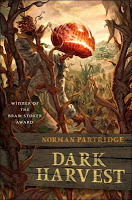 As part of our continuing Visiting Writers Program at Seton Catholic Central High School, my Creative Writing class recently "visited" with Bram Stoker Winner Norman Partridge. Norman lives in California, and though I tried to lure him out to Binghamton for a visit, it turned out not to be cost effective.
As part of our continuing Visiting Writers Program at Seton Catholic Central High School, my Creative Writing class recently "visited" with Bram Stoker Winner Norman Partridge. Norman lives in California, and though I tried to lure him out to Binghamton for a visit, it turned out not to be cost effective. However, my class read Dark Harvest - listed by Publisher's Weekly as one of their "100 Best Books of 2006" - and they composed several insightful questions about the novel. He's posted some of them in a "Part 1" on his blog today, and will post the rest tomorrow.
Published on April 28, 2011 04:47
April 27, 2011
Why Do I Have to Blog? And Blogs I Read.
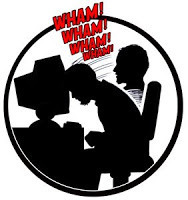 I have to admit, I've got a love-hate relationship with blogging.
I have to admit, I've got a love-hate relationship with blogging.One problem is I'm continually plagued by the suspicion I've got nothing unique or interesting to say. Really, the only thing interesting about me are the stories I write - and who knows how interesting those are - and that's it. In fact, if Abby (my wife) hadn't encouraged me that a blog mixing our family experiences with Autism Spectrum Disorders and my writing journey would be interesting to some, I wouldn't have restarted my blog (almost a year ago, now) at all.
Second - and I'll admit to being a little old before my time, here - I still chafe at the idea that an author should be blogging all the time. Seems like an author should be working on their craft, and that's it. Yeah, I've heard the arguments before - blogging is writing, helps keep you in the groove, yadda-yadda. But.
It's not writing fiction. I don't want to be doing anything that's not writing fiction as it is, even if I'm not blogging a lot. I have this block in my head that says any writing that isn't writing fiction - or at least writing for publication (print, yes) - isn't high on the priority list.
Probably a lot of it has to do with my life right now. I have a 6 and 4 year old, and get up every morning at 3 AM just to fit my allotted reading and writing time in. A lot of times, I'm faced with a choice: blog or write fiction? Obviously, I'm going to choose the latter, and probably always will...until maybe my schedule gets free enough to allow both (this does happen over summer, as usually I stay home and watch Madi).
Plus...have there really been ANY reliable statistics compiled linking active author bloggers to book sales/writer popularity/word of mouth marketing? (I'm not being snarky; seriously, I want to know). Because again...I wonder. Yeah, you have to be visible and people have to see you, and maybe if you have a neat blogging angle folks will become interested in you as a person, then maybe become interested in your fiction.....
But does that really work? I've a sneaky suspicion over half my blog readers who love my posts about our family have little or no interest in my fiction at all, especially the horror/weird stuff. Besides - and admittedly, I may be a relic in this regard - I don't find a blog, become interested in that writer, then buy their fiction. I become a fan of their FICTION first, then end up noticing they have a blog. And even then I don't always follow it. I'm still stuck on this notion that if the writing is great and so is the story, readers will come, blog or not.
For me, I've worked out a nice compromise: this blog is two-fold. I post publishing news here (for my four or five readers and relatives and peeps in the publishing industry) and I use it as a diary, basically, for when I need to "blog off" steam (see what I did there?) about writing, publishing, our family experiences, whatever. Or when I find some really sweet prose I want to share (again, with my four or five readers). Or to share anything that tickles my whimsy.
But the craft must come first. At least for me. Even today, I'm only blogging because I'm taking the day off for some appointments, and can also spend the morning writing.
Anyway. I've got very few author blogs I follow. SO, without further ado:
Brian Keene - I check it literally every day. First of all, for horror writers, it's the best source of industry news around. Some folks have taken Brian to task for being too negative, critical, whatever. THIS newbie, however, is imminently thankful for all the news and blunt, straightforward advice Brian gives. Plus, I spend half the time snorting my energy drink out my nose from all the funnies...
Mike Duran - Not only is he a fine, fine writer (you really should go get his first novel), he is a dedicated, PROLIFIC blogger. I've seen some of his entries sky-rocket over 100 comments. He's not afraid to tackle any topic, and he's one of those "I've got something planned for my blog every day" type of bloggers. I don't know where he gets the energy to blog like that, write so well, and still work a full time job. Of course, his kids are grown and moved out, so maybe.....someday....
Nate Southard - Nate's a perfect example of a guy whose blog I follow because of his WRITING and his developing career; I didn't start buying his work because of his blog. I check Nate's blog a lot, because I sense he's about five years ahead of me on his career path (that's making the grand assumption I'll ever be as good as he is), and I'm interested in watching his moves, checking out his choices and plans.
Tomoview - Okay, this one might seem mean spirited, but it highlights a point that I'm unwilling to back down from, even if I put it into practice in a much....ahem, GENTLER fashion.
Bad writing is bad writing. That's all.
There's a lot of bad writing out there. And Tomo ain't afraid to go there. Again, might seem mean, but first: if you want to be a writer, either grow a thick skin or check out, and second: I read his....ah....CRITIQUES... and instantly think: "Omigod. Did I just write that?"
Every writer and writer-wanna be should live in fear of a Tomoview. Note: not for the sensitive or faint of heart.
Norman Partridge: At the risk of carrying my Partridge-love to ridiculous extremes, Norm's blog is one of my favorites because I sense he blogs about what he loves: the genre, music, sports, memories of the movies and TV he loved as a kid. He doesn't seem to have that same "angle" so many other authors desperately scramble for in their "daily questions" or interviews or whatever. He offers straightforward advice and an idea of what it's like to be inside his head, why he writes what he does. Gotta love that.
And finally, another one of my favorite author blogs, T. L. Hines. And then you say - "Wait. His last blog entry is dated November 2010. Doesn't seem to blog at all. How can this be one of your favorites?"
Simple.
Because he's too busy writing his next, awesome novel, which plenty of people will buy not because of his blogging, but because of his craft.
'Nuff said.
Published on April 27, 2011 04:53
April 25, 2011
School's In: More Miskatonic Goodness
Published on April 25, 2011 17:48
Prose For You This Morning....
Here it is, kids...from The Hour of the Oxrun Dead, by Charles L. Grant.
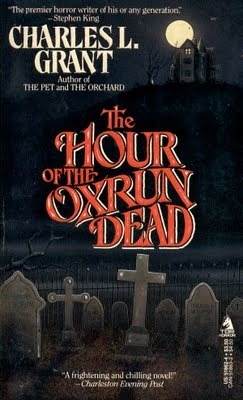 She opened her eyes and was swept by the sensation that she was floating aimlessly beneath the surface of a grey motionless sea, and all her gestures took minutes instead of seconds to complete. She tried to count how many drinks she'd had tonight. Two or three at the mansion, at least two at the Inn, and whatever had been in them was not mixing well. She passed a hand over her damp forehead and looked over the counter, aware that Marc was speaking to her but she was unable to hear or understand him. She smiled weakly, then laughed at the comical twist his lips had taken as they groped for words. Another laugh when he reached out for her hand and a glaring red lightning bolt leaped painlessly between the tips of her fingers. She floated a hand over the invoices and saw them flutter like birds disturbed in their sleep. Without warning, her stomach clenched and she grabbed at it, reached out a hand to brace herself against the desk.
She opened her eyes and was swept by the sensation that she was floating aimlessly beneath the surface of a grey motionless sea, and all her gestures took minutes instead of seconds to complete. She tried to count how many drinks she'd had tonight. Two or three at the mansion, at least two at the Inn, and whatever had been in them was not mixing well. She passed a hand over her damp forehead and looked over the counter, aware that Marc was speaking to her but she was unable to hear or understand him. She smiled weakly, then laughed at the comical twist his lips had taken as they groped for words. Another laugh when he reached out for her hand and a glaring red lightning bolt leaped painlessly between the tips of her fingers. She floated a hand over the invoices and saw them flutter like birds disturbed in their sleep. Without warning, her stomach clenched and she grabbed at it, reached out a hand to brace herself against the desk.
"Marc!" she managed to gasp, and watched helplessly as he sprawled over the counter and slid slowly out of sight to the floor. The folders tipped after him.
Slowly.
A tear etched into her cheek. She released the counter to wipe it away, swayed and stumbled backwards, spun around and grabbed the chair. It skittered away. She fell. Landed on her shoulder, toppled to her back while the ceiling whirled above her, the chandelier swinging in time to an inaudible tune.
Voices, then.
A whispering.
Little children sneaking fearfully through a haunted house in the wake of midnignt....
 She opened her eyes and was swept by the sensation that she was floating aimlessly beneath the surface of a grey motionless sea, and all her gestures took minutes instead of seconds to complete. She tried to count how many drinks she'd had tonight. Two or three at the mansion, at least two at the Inn, and whatever had been in them was not mixing well. She passed a hand over her damp forehead and looked over the counter, aware that Marc was speaking to her but she was unable to hear or understand him. She smiled weakly, then laughed at the comical twist his lips had taken as they groped for words. Another laugh when he reached out for her hand and a glaring red lightning bolt leaped painlessly between the tips of her fingers. She floated a hand over the invoices and saw them flutter like birds disturbed in their sleep. Without warning, her stomach clenched and she grabbed at it, reached out a hand to brace herself against the desk.
She opened her eyes and was swept by the sensation that she was floating aimlessly beneath the surface of a grey motionless sea, and all her gestures took minutes instead of seconds to complete. She tried to count how many drinks she'd had tonight. Two or three at the mansion, at least two at the Inn, and whatever had been in them was not mixing well. She passed a hand over her damp forehead and looked over the counter, aware that Marc was speaking to her but she was unable to hear or understand him. She smiled weakly, then laughed at the comical twist his lips had taken as they groped for words. Another laugh when he reached out for her hand and a glaring red lightning bolt leaped painlessly between the tips of her fingers. She floated a hand over the invoices and saw them flutter like birds disturbed in their sleep. Without warning, her stomach clenched and she grabbed at it, reached out a hand to brace herself against the desk."Marc!" she managed to gasp, and watched helplessly as he sprawled over the counter and slid slowly out of sight to the floor. The folders tipped after him.
Slowly.
A tear etched into her cheek. She released the counter to wipe it away, swayed and stumbled backwards, spun around and grabbed the chair. It skittered away. She fell. Landed on her shoulder, toppled to her back while the ceiling whirled above her, the chandelier swinging in time to an inaudible tune.
Voices, then.
A whispering.
Little children sneaking fearfully through a haunted house in the wake of midnignt....
Published on April 25, 2011 02:58
April 22, 2011
Do We Need to See the Monster, Part 2: Charles Grant's Oxrun Station
So yesterday I talked a bit about my "horror" background - paltry as it is - and my subsequent attempts at boning up on my horror education, then broached upon the subject of Charles Grant, Repairman Jack and the question: "Do we need to see the monster in horror?"
Please understand. I know I'm not blogging about anything radically unique or broaching topics no one has ever thought about. However, I'm finding that more and more just thinking about my work and where I want my career to go, what I want my writing to look like isn't sufficient anymore. I need to write about it, more and more these days, so that's what this is. We all read what we like. Some folks want to see the monster; some don't. Me, I'm just trying to work things out in my head, and this is kinda like a diary of that.
Anyway.
I noted that in the Oxrun stories I've read by Grant so far, we don't "see" much of the monster - just its "wake" (grabbed that from Justin's comment from yesterday. Nice!), as some vague, shadowy and slippery but undefined evil/darkness preys on the flaws of weak people. Those Oxrun novels/novella collections end with a sense of resolution, but there's little or no "victory".
The victims disappear and are forgotten, and the evil/darkness slides away to hide and sleep in the shadows until next time. And I'm getting the idea that more than likely, there's no novel revealing the "source" of this evil, no penultimate showdown in which courageous Oxrun citizens face this evil and destroy it once and for all.
Now, in Repairman Jack (F. Paul Wilson - can you tell I'm hooked on two authors at the moment?), Jack gets to face the bad guy in each novel, and for the most part he "wins", even if he's scarred along the way. Not only is there tons of resolution there, but we get a hero to cheer for, too.
I love both of them. I love Grant's haunting prose, and let's be honest - evil so often wins in our world. Too often. Those of us harboring a melancholic nature probably think about this more than we should, and something in Grant's dark stories really appeals to me, because something in them comes very close to this admittedly dark world of our own.
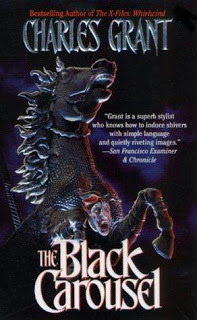 And the Oxrun novella collections - of which I've read Black Carousel, Nightmare Seasons, Dialing the Wind, and The Orchard - have an awesome structure I'd love to copy. These are collections of four novellas each, framed by the first person narrative of an author living in Oxrun, chronicling the town's dark history through varied means: a book given to him, discovered journals, news reports, even gossip.
And the Oxrun novella collections - of which I've read Black Carousel, Nightmare Seasons, Dialing the Wind, and The Orchard - have an awesome structure I'd love to copy. These are collections of four novellas each, framed by the first person narrative of an author living in Oxrun, chronicling the town's dark history through varied means: a book given to him, discovered journals, news reports, even gossip.
While the novellas themselves may lack resolution because of their open ended nature, the first person frame offers resolution by a recounting of what everyone in town ultimately thinks has happened to these people. Even better, we're given to believe that this author is Grant himself. He even signs off on one of them, "Charles Grant, Oxrun Station, New Jersey".
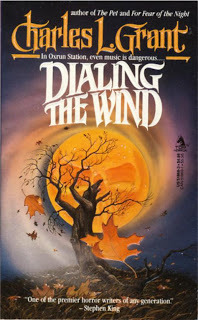
The Oxrun novels and other Charles Grant novels I've read: The Grave, The Last Call of Mourning, For Fear of the Night, Stunts, The Nestling, and just recently The Tea Party offer what I consider the best of both worlds. They feature good guys we can root for. The evil is slightly more defined, but often not given a name...and that's what I like best, I think. By not giving a specific name or legend or myth or utilizing a particular demon or recognized motif, Grant is latching onto something bigger than just a particular monster.
It's the concept. The idea. Something that many, many people from different cultures and beliefs can latch on to. He's addressing something more universal, which takes more skill, I think. More knowledge, greater subtlety in storytelling. Have to be REALLY well-read, with a diverse reading diet to do something like this, to mix and match and swirl all these things together without leaning on a cliche.
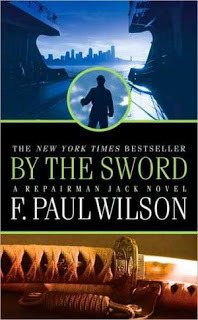 Now, Repairman Jack represents something I'm afraid of never being able to accomplish: a hero we can latch on to and root for, a definite bad guy to beat, but this cosmic war Jack's caught up in - recruited by the Ally to fight agents of the Otherness - is also very universal, and doesn't read as leaning upon tropes...but as explaining the source of all tropes. Repairman Jack's adventure is the most "Lovecraftian without being Lovecraftian" thing I've ever read.
Now, Repairman Jack represents something I'm afraid of never being able to accomplish: a hero we can latch on to and root for, a definite bad guy to beat, but this cosmic war Jack's caught up in - recruited by the Ally to fight agents of the Otherness - is also very universal, and doesn't read as leaning upon tropes...but as explaining the source of all tropes. Repairman Jack's adventure is the most "Lovecraftian without being Lovecraftian" thing I've ever read.
What's the end of all this?
I want to write something stylistically elegant - like Grant - that invokes that sense of melancholy, inject it with the punch and voice of Paul Wilson and Norman Partridge, while also giving readers heroes like Jack we can relate to and root for. Even if they might not ultimately win the day.
Boy. I'm not asking for much.
So how about you? Show the monster? Or go for the concept?
Please understand. I know I'm not blogging about anything radically unique or broaching topics no one has ever thought about. However, I'm finding that more and more just thinking about my work and where I want my career to go, what I want my writing to look like isn't sufficient anymore. I need to write about it, more and more these days, so that's what this is. We all read what we like. Some folks want to see the monster; some don't. Me, I'm just trying to work things out in my head, and this is kinda like a diary of that.
Anyway.
I noted that in the Oxrun stories I've read by Grant so far, we don't "see" much of the monster - just its "wake" (grabbed that from Justin's comment from yesterday. Nice!), as some vague, shadowy and slippery but undefined evil/darkness preys on the flaws of weak people. Those Oxrun novels/novella collections end with a sense of resolution, but there's little or no "victory".
The victims disappear and are forgotten, and the evil/darkness slides away to hide and sleep in the shadows until next time. And I'm getting the idea that more than likely, there's no novel revealing the "source" of this evil, no penultimate showdown in which courageous Oxrun citizens face this evil and destroy it once and for all.
Now, in Repairman Jack (F. Paul Wilson - can you tell I'm hooked on two authors at the moment?), Jack gets to face the bad guy in each novel, and for the most part he "wins", even if he's scarred along the way. Not only is there tons of resolution there, but we get a hero to cheer for, too.
I love both of them. I love Grant's haunting prose, and let's be honest - evil so often wins in our world. Too often. Those of us harboring a melancholic nature probably think about this more than we should, and something in Grant's dark stories really appeals to me, because something in them comes very close to this admittedly dark world of our own.
 And the Oxrun novella collections - of which I've read Black Carousel, Nightmare Seasons, Dialing the Wind, and The Orchard - have an awesome structure I'd love to copy. These are collections of four novellas each, framed by the first person narrative of an author living in Oxrun, chronicling the town's dark history through varied means: a book given to him, discovered journals, news reports, even gossip.
And the Oxrun novella collections - of which I've read Black Carousel, Nightmare Seasons, Dialing the Wind, and The Orchard - have an awesome structure I'd love to copy. These are collections of four novellas each, framed by the first person narrative of an author living in Oxrun, chronicling the town's dark history through varied means: a book given to him, discovered journals, news reports, even gossip. While the novellas themselves may lack resolution because of their open ended nature, the first person frame offers resolution by a recounting of what everyone in town ultimately thinks has happened to these people. Even better, we're given to believe that this author is Grant himself. He even signs off on one of them, "Charles Grant, Oxrun Station, New Jersey".

The Oxrun novels and other Charles Grant novels I've read: The Grave, The Last Call of Mourning, For Fear of the Night, Stunts, The Nestling, and just recently The Tea Party offer what I consider the best of both worlds. They feature good guys we can root for. The evil is slightly more defined, but often not given a name...and that's what I like best, I think. By not giving a specific name or legend or myth or utilizing a particular demon or recognized motif, Grant is latching onto something bigger than just a particular monster.
It's the concept. The idea. Something that many, many people from different cultures and beliefs can latch on to. He's addressing something more universal, which takes more skill, I think. More knowledge, greater subtlety in storytelling. Have to be REALLY well-read, with a diverse reading diet to do something like this, to mix and match and swirl all these things together without leaning on a cliche.
 Now, Repairman Jack represents something I'm afraid of never being able to accomplish: a hero we can latch on to and root for, a definite bad guy to beat, but this cosmic war Jack's caught up in - recruited by the Ally to fight agents of the Otherness - is also very universal, and doesn't read as leaning upon tropes...but as explaining the source of all tropes. Repairman Jack's adventure is the most "Lovecraftian without being Lovecraftian" thing I've ever read.
Now, Repairman Jack represents something I'm afraid of never being able to accomplish: a hero we can latch on to and root for, a definite bad guy to beat, but this cosmic war Jack's caught up in - recruited by the Ally to fight agents of the Otherness - is also very universal, and doesn't read as leaning upon tropes...but as explaining the source of all tropes. Repairman Jack's adventure is the most "Lovecraftian without being Lovecraftian" thing I've ever read.What's the end of all this?
I want to write something stylistically elegant - like Grant - that invokes that sense of melancholy, inject it with the punch and voice of Paul Wilson and Norman Partridge, while also giving readers heroes like Jack we can relate to and root for. Even if they might not ultimately win the day.
Boy. I'm not asking for much.
So how about you? Show the monster? Or go for the concept?
Published on April 22, 2011 06:29
April 21, 2011
Do We Need to See the Monster, Part 1: Defining Myself as a Horror Writer
I have a confession to make.
Five years ago, when I began actively pursuing a writing career, I had a hard time deciding I was a horror writer. When asked, I 'd say I wrote "weirdly speculative suspense/thriller/ghost stories sorta like Dean Koontz and Stephen King."
Also, like a lot of young horror writers, my main influences at the time were Stephen King and Dean Koontz, with a smattering of John Saul. I had just started sampling Peter Straub, (and was quickly hooked), and had just heard of this Brian Keene guy who wrote for some publishing brand called Leisure Fiction (which sounded vaguely like a porn publisher).
I had a hard time accepting the horror label because also like a lot of young writers, I associated "horror" primarily with slasher flicks and gore-fest movies, only I didn't try to write like slasher flicks and gore-fests, because I didn't (and still don't) really like those kinds of movies. Actually, I kinda detest them. Just aren't my thing. So at the time, my perception of "horror" didn't fit what I wanted to write.
But I didn't seem to fit in anywhere. At the time, I was aiming for the CBA (Christian Bookseller Association). I was growing in my faith, figuring out who I wanted to be as a person and writer, and I'd just read Waking Lazarus by T. L. Hines and Comes A Horseman by Robert Liparulo, found them very well written and pretty intense for "Christian fiction".
However, after two years of reviewing CBA books, I found T.L. and Rob - along with Travis Thrasher - to be exceptions to the norm for CBA fiction. Plus, I'd seen all the pictures of CBA authors attending Christian Book Conferences. They looked like they were at tea parties, for goodness sake. Not exactly my scene.
SO, along came this speculative journal called The Midnight Diner. They had a Lovecraft category, and I'd sampled Lovecraft and Cthulhu, liked it, and wrote a mythos story. Not only accepted, it took Editor's Choice honors. Then, along came a publisher named Shroud, and their anthology call for monster stories. I wrote one called The Water God of Clarke Street, and it was accepted.
Then came Shroud's call for novella pitches for this Hiram Grange series. I hesitated at first. This was it, wasn't it? No one could mistake Hiram Grange for anything other than a horror/dark fiction series, and this wasn't a short story. Writing this would plunk me solidly into the secular market, as well as the horror genre.
So I took a deep breath and plunged in headlong, and haven't regretted it since.
I am a horror writer.
But I quickly realized - especially after back-to-back stints at Borderlands Press' Writers Bootcamp - that I was a horribly undereducated horror writer, something that was underscored in my recent night out with Paul Wilson and Tom Monteleone.
SO, I widened my diet. Discovered writers like Gary Braunbeck, Nate Kenyon, Mary Sangiovanni, Ron Malfi, Ramsey Campbell, Mort Castle, Norman Prentiss, Rob Dunbar, Rio Youers; discovered Ray Bradbury's early work in The October Country and realized that HE could've been considered a horror writer, also...
I could go on. Bottom line, after discovering these writers, I realized, truly and fully....
"Hey. I'm a horror writer."
So I went out and wrote some short stories, started submitting them. They were mostly rejected. I can see why, now. I'd decided I was a "horror writer", so now I was writing stories that were OBVIOUS HORROR STORIES. No subtlety. No depth. Maybe those stories would've sold ten years ago when there were a lot more paying markets, but they just weren't selling now.
This is about the time time I discovered Charles Grant, and instantly fell in love. His prose enchanted me. He was like the "dark chocolate" version of Ray Bradbury, if that makes any sense. His Oxrun Station novels have become my crack. I MUST have more. But, I've discovered something about Grant's work, what I've consumed so far, anyway.
He rarely shows us the monster. Especially in his Oxrun Station novella collections. There's a vague, flitting "evil" or "darkness" that eventually takes advantage of his characters' weaknesses and consumes them, but he doesn't ever SHOW us - not in what I've read so far - what it is that plagues Oxrun. He focuses primarily on the characters and their weaknesses.
Same is true in his novels For Fear of the Night and Stunts. The "monster" is very vague and shadowy, never coming into the light. However, three of his novels so far DO show the monsters: The Nestling, Symphony, and my current Grant read The Tea Party. I've found that as much as I love his Oxrun novels, I've liked these three the best.
So I love Grant's prose. I love his elegance, his sense of rhythm and lyricism. But....in the end...
I want to see the monster.
And I want to beat the monster. As much as I love Grant's work, the monster very often wins.
Now, other side of the spectrum (and I really hope he doesn't think I'm pimping on him too much) is F. Paul Wilson and Repairman Jack. I like Paul's prose just as much as Grant's. It's lean. Mean. But not emaciated. The Repairman Jack stories move at a break-neck pace. And, even though his novels aren't all "happy-go-lucky", we get to see the monster. And, even if he gets knocked around pretty bad, suffers some wounds (especially after Gateways), we get to see Jack beat the monster.
So, the question I leave you with for today, which I'll expound on tomorrow when I take a closer look at the Oxrun Station novels is this: Do we need to see the monster? Do we need to know what it is, explicitly? And do we need to beat it, or can resolution of the story's conflict still be found without beating it?

Five years ago, when I began actively pursuing a writing career, I had a hard time deciding I was a horror writer. When asked, I 'd say I wrote "weirdly speculative suspense/thriller/ghost stories sorta like Dean Koontz and Stephen King."
Also, like a lot of young horror writers, my main influences at the time were Stephen King and Dean Koontz, with a smattering of John Saul. I had just started sampling Peter Straub, (and was quickly hooked), and had just heard of this Brian Keene guy who wrote for some publishing brand called Leisure Fiction (which sounded vaguely like a porn publisher).
I had a hard time accepting the horror label because also like a lot of young writers, I associated "horror" primarily with slasher flicks and gore-fest movies, only I didn't try to write like slasher flicks and gore-fests, because I didn't (and still don't) really like those kinds of movies. Actually, I kinda detest them. Just aren't my thing. So at the time, my perception of "horror" didn't fit what I wanted to write.
But I didn't seem to fit in anywhere. At the time, I was aiming for the CBA (Christian Bookseller Association). I was growing in my faith, figuring out who I wanted to be as a person and writer, and I'd just read Waking Lazarus by T. L. Hines and Comes A Horseman by Robert Liparulo, found them very well written and pretty intense for "Christian fiction".
However, after two years of reviewing CBA books, I found T.L. and Rob - along with Travis Thrasher - to be exceptions to the norm for CBA fiction. Plus, I'd seen all the pictures of CBA authors attending Christian Book Conferences. They looked like they were at tea parties, for goodness sake. Not exactly my scene.
SO, along came this speculative journal called The Midnight Diner. They had a Lovecraft category, and I'd sampled Lovecraft and Cthulhu, liked it, and wrote a mythos story. Not only accepted, it took Editor's Choice honors. Then, along came a publisher named Shroud, and their anthology call for monster stories. I wrote one called The Water God of Clarke Street, and it was accepted.
Then came Shroud's call for novella pitches for this Hiram Grange series. I hesitated at first. This was it, wasn't it? No one could mistake Hiram Grange for anything other than a horror/dark fiction series, and this wasn't a short story. Writing this would plunk me solidly into the secular market, as well as the horror genre.
So I took a deep breath and plunged in headlong, and haven't regretted it since.
I am a horror writer.
But I quickly realized - especially after back-to-back stints at Borderlands Press' Writers Bootcamp - that I was a horribly undereducated horror writer, something that was underscored in my recent night out with Paul Wilson and Tom Monteleone.
SO, I widened my diet. Discovered writers like Gary Braunbeck, Nate Kenyon, Mary Sangiovanni, Ron Malfi, Ramsey Campbell, Mort Castle, Norman Prentiss, Rob Dunbar, Rio Youers; discovered Ray Bradbury's early work in The October Country and realized that HE could've been considered a horror writer, also...
I could go on. Bottom line, after discovering these writers, I realized, truly and fully....
"Hey. I'm a horror writer."
So I went out and wrote some short stories, started submitting them. They were mostly rejected. I can see why, now. I'd decided I was a "horror writer", so now I was writing stories that were OBVIOUS HORROR STORIES. No subtlety. No depth. Maybe those stories would've sold ten years ago when there were a lot more paying markets, but they just weren't selling now.
This is about the time time I discovered Charles Grant, and instantly fell in love. His prose enchanted me. He was like the "dark chocolate" version of Ray Bradbury, if that makes any sense. His Oxrun Station novels have become my crack. I MUST have more. But, I've discovered something about Grant's work, what I've consumed so far, anyway.
He rarely shows us the monster. Especially in his Oxrun Station novella collections. There's a vague, flitting "evil" or "darkness" that eventually takes advantage of his characters' weaknesses and consumes them, but he doesn't ever SHOW us - not in what I've read so far - what it is that plagues Oxrun. He focuses primarily on the characters and their weaknesses.
Same is true in his novels For Fear of the Night and Stunts. The "monster" is very vague and shadowy, never coming into the light. However, three of his novels so far DO show the monsters: The Nestling, Symphony, and my current Grant read The Tea Party. I've found that as much as I love his Oxrun novels, I've liked these three the best.
So I love Grant's prose. I love his elegance, his sense of rhythm and lyricism. But....in the end...
I want to see the monster.
And I want to beat the monster. As much as I love Grant's work, the monster very often wins.
Now, other side of the spectrum (and I really hope he doesn't think I'm pimping on him too much) is F. Paul Wilson and Repairman Jack. I like Paul's prose just as much as Grant's. It's lean. Mean. But not emaciated. The Repairman Jack stories move at a break-neck pace. And, even though his novels aren't all "happy-go-lucky", we get to see the monster. And, even if he gets knocked around pretty bad, suffers some wounds (especially after Gateways), we get to see Jack beat the monster.
So, the question I leave you with for today, which I'll expound on tomorrow when I take a closer look at the Oxrun Station novels is this: Do we need to see the monster? Do we need to know what it is, explicitly? And do we need to beat it, or can resolution of the story's conflict still be found without beating it?
Published on April 21, 2011 04:49
April 20, 2011
The Terror at Miskatonic Falls
Coming sometime this summer, edited by yours truly and illustrated by the magnificent Danny Evarts....
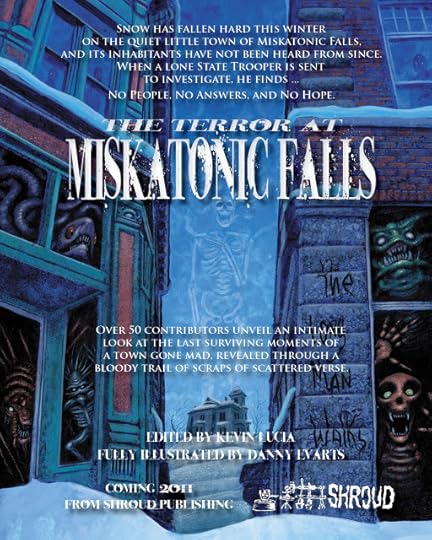


Published on April 20, 2011 00:51
April 19, 2011
Interview at Ginger Nuts of Horror: Hiram Grange, My Favorite Writers, Miskatonic Falls, Ebooks, My Future
 I wasn't sure, really, WHAT a ginger nut was at first. It sounded vaugely naughty. I googled it, however, and apparently they're types of ginger bisquit cookies, which I realized I'd had before, they just hadn't been called that.
I wasn't sure, really, WHAT a ginger nut was at first. It sounded vaugely naughty. I googled it, however, and apparently they're types of ginger bisquit cookies, which I realized I'd had before, they just hadn't been called that.Anyway, I've been interviewed by Ginger Nuts of Horror. If you're free - don't have to wash or comb your hair, feed your cat, or pry your eye out with spoon - spin on over. I talked about the usual: Hiram Grange, my favorite writers, the upcoming poetry/prose/graphic novel The Terror at Miskatonic Falls, ebooks and the future, and where I see myself heading.
Published on April 19, 2011 09:15
April 17, 2011
Today's Beautiful Prose (again, not mine)
I've learned more from the prose of F. Paul Wilson, Norman Partridge and the late Charles Grant than anyone I've read recently. These are the only writers I've ever consciously tried to imitate in terms of style. Not copy, exactly - but really ingest their styles, let their works mold and shape my style - while still trying to write in a way that's unique to my own self.
Paul Wilson and Norman Partridge's word economy, specificity, and pacing are marvelous. Wilson's Repairman Jack novels move so well, cover so much territory with prose that's almost addictive. And his characterization, even of bit players is superb. Norman Partridge's words hit like quick, sharp jabs. Like precise chisel-strikes that carve out rock-solid stories. Anyone who wants to learn something about characterization and POV, start with Paul's The Tomb and read on. For some writing that packs serious punch - I mean, that will literally kick you off your feet - start with Norman's Dark Harvest.
Charles Grant, however. His prose is beautiful, in that melancholic way that only other folks prone to melancholy (like myself) can appreciate as being beautiful. I've got a more detailed post about his work later on this week, but for now, the following samplings are today's "beautiful prose of the day", a two-fer-one deal...
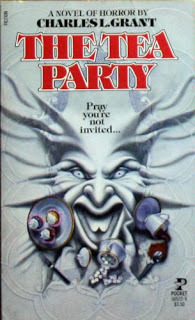 The fog had been there from the beginning.
The fog had been there from the beginning.
When the Appalachians rose in dark volcanic flame and the sea slid back boiling, when the centuries-old glaciers gouged and ground and crushed their way through to pulverize the land and create the narrow valleys, when the lakes filled with rain and the beasts returned to prowl the forests, the fog was there, barely shifting, seldom rising; when the trees finally grew and the land became fertile, when the birds returned to roost and Man was born, the fog was there, breath of the night and mirror of the moon, scuttling to shadow ahead of the sun, returning to dusk to reclaim its place.
From The Tea Party.
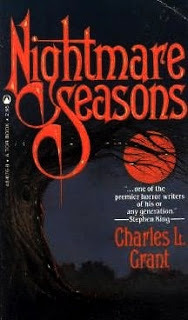 I stand at the window, hands in the pockets of my robe after cleaning my glasses for the fifth or sixth time and lighting another cigarette that, for some reason or other, I don't bother to finish. The rain is still falling (sheeting now against the window) , the wind has found a crack under the front door (it's colder than before) and the house has filled with shadows that bring with them distant whisperings.
I stand at the window, hands in the pockets of my robe after cleaning my glasses for the fifth or sixth time and lighting another cigarette that, for some reason or other, I don't bother to finish. The rain is still falling (sheeting now against the window) , the wind has found a crack under the front door (it's colder than before) and the house has filled with shadows that bring with them distant whisperings.
Meanwhile...I stand at the window, with the book shimmering behind me, and I see each time the wind shifts the indistinct figure of someone standing just outside the reach of the streetlight, of someone darker than shadow in the corner of my porch, of someone waiting on the lawn, oblivious to the storm.
From Nightmare Seasons.
Paul Wilson and Norman Partridge's word economy, specificity, and pacing are marvelous. Wilson's Repairman Jack novels move so well, cover so much territory with prose that's almost addictive. And his characterization, even of bit players is superb. Norman Partridge's words hit like quick, sharp jabs. Like precise chisel-strikes that carve out rock-solid stories. Anyone who wants to learn something about characterization and POV, start with Paul's The Tomb and read on. For some writing that packs serious punch - I mean, that will literally kick you off your feet - start with Norman's Dark Harvest.
Charles Grant, however. His prose is beautiful, in that melancholic way that only other folks prone to melancholy (like myself) can appreciate as being beautiful. I've got a more detailed post about his work later on this week, but for now, the following samplings are today's "beautiful prose of the day", a two-fer-one deal...
 The fog had been there from the beginning.
The fog had been there from the beginning.When the Appalachians rose in dark volcanic flame and the sea slid back boiling, when the centuries-old glaciers gouged and ground and crushed their way through to pulverize the land and create the narrow valleys, when the lakes filled with rain and the beasts returned to prowl the forests, the fog was there, barely shifting, seldom rising; when the trees finally grew and the land became fertile, when the birds returned to roost and Man was born, the fog was there, breath of the night and mirror of the moon, scuttling to shadow ahead of the sun, returning to dusk to reclaim its place.
From The Tea Party.
 I stand at the window, hands in the pockets of my robe after cleaning my glasses for the fifth or sixth time and lighting another cigarette that, for some reason or other, I don't bother to finish. The rain is still falling (sheeting now against the window) , the wind has found a crack under the front door (it's colder than before) and the house has filled with shadows that bring with them distant whisperings.
I stand at the window, hands in the pockets of my robe after cleaning my glasses for the fifth or sixth time and lighting another cigarette that, for some reason or other, I don't bother to finish. The rain is still falling (sheeting now against the window) , the wind has found a crack under the front door (it's colder than before) and the house has filled with shadows that bring with them distant whisperings.Meanwhile...I stand at the window, with the book shimmering behind me, and I see each time the wind shifts the indistinct figure of someone standing just outside the reach of the streetlight, of someone darker than shadow in the corner of my porch, of someone waiting on the lawn, oblivious to the storm.
From Nightmare Seasons.
Published on April 17, 2011 11:12
April 9, 2011
My Novel Sucks, But Maybe Harper Lee and Robert McCammon Can Save It
This is really way too long, so I apologize in advance...
So, yes. I know. I've said this a lot in the past year.
My novel sucks.
It's a mess.
Dead on arrival.
Common advice has always been that a novelist writes one or two "failures" before actually getting it right. This is a big reason why more and more I'm against easy, POD publishing of a first novel. Because let's be honest. Most first novels should never see the light of day, and I'm beginning to think that's the case here.
I wrote a really bad first installment - over 178,000 words - to an even worse science fiction epic trilogy when I was 24. Obviously, it garnered nothing but rejections. So that was Failure #1.
I then spent the following six years re-drafting half a novel, also the first installment of an epic thriller/horror/suspense series. That never even got finished. So Failure #2.
I swore off novels for awhile. Started to actually learn how to write. Struck up the book review gig. Wrote columns and articles for a whole year. Finally sold my first "short" story, a novelette of 10,000 words, an okay story that won Editor's Choice in an anthology. I then wrote a ton of bad short stories, discovered "4thluv" and "token" payment markets just weren't the way to go.
Then I sold my next "short" story, (this time only 9,000 words), which was slightly better. I was then invited (not really solicited, yet), to write two more stories, one which turned out to be 6,000 words and the other about 3,000 words. They were "okay" stories also, and in retrospect, I only really like one of those, because the other was just too much of me too obviously "doing the horror story thing". But, after that, I "sold" officially my shortest story ever, a piece of flash fiction around 700 words. I like that story and it's better than "okay", because it's very personal.
During this time period, I completed my classwork in my Creative Writing Masters at BU and attended two consecutive years of Borderlands Press Writers Bootcamp. Still doing the review thing. Edited a Lovecraftian poetry anthology that's very likely going to be a lot better than "okay".
Then, I wrote this Hiram Grange thingie, which turned out to be a revelation. That turned out to be WAY more than just okay. I mean, two years later and I still actually like it. That's saying something. And apparently, a bunch of other folks liked it, too. Then, I had the extreme pleasure of editing Shroud #10.
I thought I was ready to write a novel.
But now, over a year after it's initial conception, I may very well be staring at Failure #3.
In some ways, I consider myself lucky. This novel obviously isn't what it should be. What if I was able to somehow finish it, spruce it up enough to publish in the small press, despite its shortcomings? Again, sometimes it's better for something NOT to get published.
I understand now why Hiram Grange turned out so well and this hasn't. First of all, Hiram was a novella in a novella series and not my creation. I had to adhere to certain criteria, and let's be honest: I'm pretty good when it comes to following directions. Always have been. I've always told Abby, if you have things you need me to do, make me a list. 99% of the time, if there's a list, I'll come through.
So Hiram had a "list", if you will, laid down by Shroud. Tim Deal was awesome and so very flexible, but still. A list. Something I could adhere to.
This is probably why I should outline more. Which I did with my proposal to the New York House, but the funny thing is: if they offered a contract tomorrow, I know I could bang that thing right out. I don't want to start it, however, without an offer. Don't know why. As passionate as I am about that series, it just feels like something I want official word on before committing myself to.
Anyway.
My biggest problem?
I can't plot. At all. Things always get too complicated and muddled. I've gotten more and more confident in my prose and my characters, and this "big huge mess" I'm calling my novel has a lot of great prose and awesome scenes with compelling characters...
But I have NO idea what they should ultimately do. More and more, I think I need to tear the whole thing down and start all over.
Things are not so bad. I recently sold what might be my best short story to the highest market yet, (can't share yet but really want to), I completed a story solicited this summer, and though I'm waiting for word from that editor, I feel very proud of the job I did with it, and I just sent a story to pre-readers that has a better-than-average chance in a pro-anthology.
But I may have to face the fact that I'm poised on the brink of novel failure #3.
Why the Harper Lee and Robert McCammon mention?
It's impossible to pick a "favorite" of all the books I've read, but two of the finest books I've ever read are To Kill a Mockingbird (Lee) and Boy's Life (McCammon). What amazes me about both works is that they are...and AREN'T, at ALL...centered around their plots.
To Kill A Mockingbird poses three central conflicts:
1. the mystery of Boo Radley
2. Tom Robinson's trial
3. the looming vengeance of Bob Ewell
But the story surrounding these conflicts is so rich, substantial, all-consuming that you get lost in all THOSE stories too, which really become just as important as the central conflicts. So you experience the best of both worlds: you get caught up in the lives of the characters and read simply because of them, but then the plot's conflicts eventually come back around to resolution, closing off their arcs satisfactorily (if not "happily").
Boy's Life does something very similar. The novel starts with its principal mystery: whose dead body is in the car Cory Mackenson and his dad see pushed into a lake, who killed him, why - then embarks on this STUNNING journey through childhood, hitting all these small plot arcs along the way, so many I can't even name, bringing all of those - no matter how minor - to resolution, yet still looming in the background is the chilling fact that someone Cory has known his entire life is a cold blooded killer. And, in the end, NONE of these smaller plot arcs are minor, they ALL seem to help bring about the resolution.
So. Two examples of stories with great characters, superb prose...and plots that DON'T GET IN THE WAY OF THE STORIES.
My plot keeps getting in the way. I need to somehow get it out of the way, yet keep it in mind as a framework, to keep me from running off the page and bumping into it again, if that makes any sense.
And then we have someone I've come to think of as a master plotter, F. Paul Wilson of Repairman Jack. From listening to him, I've learned that he needs to get the story out of the way FIRST, so he knows where everything is going, and then lets the characters reveal themselves to him in ensuing drafts, as he fleshes them out along the way.
Between these two examples lies the answer for me, I think. Because somewhere along the way, even as I study writers and stories I love, I still need to find MY OWN VOICE.
And even as I've been writing this post, I've gotten more comfortable with the idea of tearing the whole thing down and starting all over. I'm 37. I can wait a few more years for the novel, if that's what it takes (assuming neither the world nor the publishing industry blows itself to hell in that time).
An early guide and associate (I'd love to call him 'friend', but I don't want to make that presumption), T. L. Hines didn't see his first novel published until he turned 40, and I've come to view him as one of the most careful AND innovative storytellers I've ever read (I personally think his Faces in the Fire is brilliant).
So I can wait. I've embarked on this whole journey of re-discovering some of the greats: Charles L. Grant, T. M. Wright, Karl Edward Wagner, J. N. Williamson, the Whispers and Shadows collections, so I'd like to just settle into reading those, soaking it all up. And, I think it was either fellow writers Kelli Owen or Maurice Broaddus who said "You never get back your first novel." That rings so true. A crappy short story can go away and fade pretty quickly. A crappy first novel, however...
Like it or not, I've always dreamed big. Maybe I just need the patience to allow my handle of the craft time to catch up with my dreams.

So, yes. I know. I've said this a lot in the past year.
My novel sucks.
It's a mess.
Dead on arrival.
Common advice has always been that a novelist writes one or two "failures" before actually getting it right. This is a big reason why more and more I'm against easy, POD publishing of a first novel. Because let's be honest. Most first novels should never see the light of day, and I'm beginning to think that's the case here.
I wrote a really bad first installment - over 178,000 words - to an even worse science fiction epic trilogy when I was 24. Obviously, it garnered nothing but rejections. So that was Failure #1.
I then spent the following six years re-drafting half a novel, also the first installment of an epic thriller/horror/suspense series. That never even got finished. So Failure #2.
I swore off novels for awhile. Started to actually learn how to write. Struck up the book review gig. Wrote columns and articles for a whole year. Finally sold my first "short" story, a novelette of 10,000 words, an okay story that won Editor's Choice in an anthology. I then wrote a ton of bad short stories, discovered "4thluv" and "token" payment markets just weren't the way to go.
Then I sold my next "short" story, (this time only 9,000 words), which was slightly better. I was then invited (not really solicited, yet), to write two more stories, one which turned out to be 6,000 words and the other about 3,000 words. They were "okay" stories also, and in retrospect, I only really like one of those, because the other was just too much of me too obviously "doing the horror story thing". But, after that, I "sold" officially my shortest story ever, a piece of flash fiction around 700 words. I like that story and it's better than "okay", because it's very personal.
During this time period, I completed my classwork in my Creative Writing Masters at BU and attended two consecutive years of Borderlands Press Writers Bootcamp. Still doing the review thing. Edited a Lovecraftian poetry anthology that's very likely going to be a lot better than "okay".
Then, I wrote this Hiram Grange thingie, which turned out to be a revelation. That turned out to be WAY more than just okay. I mean, two years later and I still actually like it. That's saying something. And apparently, a bunch of other folks liked it, too. Then, I had the extreme pleasure of editing Shroud #10.
I thought I was ready to write a novel.
But now, over a year after it's initial conception, I may very well be staring at Failure #3.
In some ways, I consider myself lucky. This novel obviously isn't what it should be. What if I was able to somehow finish it, spruce it up enough to publish in the small press, despite its shortcomings? Again, sometimes it's better for something NOT to get published.
I understand now why Hiram Grange turned out so well and this hasn't. First of all, Hiram was a novella in a novella series and not my creation. I had to adhere to certain criteria, and let's be honest: I'm pretty good when it comes to following directions. Always have been. I've always told Abby, if you have things you need me to do, make me a list. 99% of the time, if there's a list, I'll come through.
So Hiram had a "list", if you will, laid down by Shroud. Tim Deal was awesome and so very flexible, but still. A list. Something I could adhere to.
This is probably why I should outline more. Which I did with my proposal to the New York House, but the funny thing is: if they offered a contract tomorrow, I know I could bang that thing right out. I don't want to start it, however, without an offer. Don't know why. As passionate as I am about that series, it just feels like something I want official word on before committing myself to.
Anyway.
My biggest problem?
I can't plot. At all. Things always get too complicated and muddled. I've gotten more and more confident in my prose and my characters, and this "big huge mess" I'm calling my novel has a lot of great prose and awesome scenes with compelling characters...
But I have NO idea what they should ultimately do. More and more, I think I need to tear the whole thing down and start all over.
Things are not so bad. I recently sold what might be my best short story to the highest market yet, (can't share yet but really want to), I completed a story solicited this summer, and though I'm waiting for word from that editor, I feel very proud of the job I did with it, and I just sent a story to pre-readers that has a better-than-average chance in a pro-anthology.
But I may have to face the fact that I'm poised on the brink of novel failure #3.
Why the Harper Lee and Robert McCammon mention?
It's impossible to pick a "favorite" of all the books I've read, but two of the finest books I've ever read are To Kill a Mockingbird (Lee) and Boy's Life (McCammon). What amazes me about both works is that they are...and AREN'T, at ALL...centered around their plots.
To Kill A Mockingbird poses three central conflicts:
1. the mystery of Boo Radley
2. Tom Robinson's trial
3. the looming vengeance of Bob Ewell
But the story surrounding these conflicts is so rich, substantial, all-consuming that you get lost in all THOSE stories too, which really become just as important as the central conflicts. So you experience the best of both worlds: you get caught up in the lives of the characters and read simply because of them, but then the plot's conflicts eventually come back around to resolution, closing off their arcs satisfactorily (if not "happily").
Boy's Life does something very similar. The novel starts with its principal mystery: whose dead body is in the car Cory Mackenson and his dad see pushed into a lake, who killed him, why - then embarks on this STUNNING journey through childhood, hitting all these small plot arcs along the way, so many I can't even name, bringing all of those - no matter how minor - to resolution, yet still looming in the background is the chilling fact that someone Cory has known his entire life is a cold blooded killer. And, in the end, NONE of these smaller plot arcs are minor, they ALL seem to help bring about the resolution.
So. Two examples of stories with great characters, superb prose...and plots that DON'T GET IN THE WAY OF THE STORIES.
My plot keeps getting in the way. I need to somehow get it out of the way, yet keep it in mind as a framework, to keep me from running off the page and bumping into it again, if that makes any sense.
And then we have someone I've come to think of as a master plotter, F. Paul Wilson of Repairman Jack. From listening to him, I've learned that he needs to get the story out of the way FIRST, so he knows where everything is going, and then lets the characters reveal themselves to him in ensuing drafts, as he fleshes them out along the way.
Between these two examples lies the answer for me, I think. Because somewhere along the way, even as I study writers and stories I love, I still need to find MY OWN VOICE.
And even as I've been writing this post, I've gotten more comfortable with the idea of tearing the whole thing down and starting all over. I'm 37. I can wait a few more years for the novel, if that's what it takes (assuming neither the world nor the publishing industry blows itself to hell in that time).
An early guide and associate (I'd love to call him 'friend', but I don't want to make that presumption), T. L. Hines didn't see his first novel published until he turned 40, and I've come to view him as one of the most careful AND innovative storytellers I've ever read (I personally think his Faces in the Fire is brilliant).
So I can wait. I've embarked on this whole journey of re-discovering some of the greats: Charles L. Grant, T. M. Wright, Karl Edward Wagner, J. N. Williamson, the Whispers and Shadows collections, so I'd like to just settle into reading those, soaking it all up. And, I think it was either fellow writers Kelli Owen or Maurice Broaddus who said "You never get back your first novel." That rings so true. A crappy short story can go away and fade pretty quickly. A crappy first novel, however...
Like it or not, I've always dreamed big. Maybe I just need the patience to allow my handle of the craft time to catch up with my dreams.
Published on April 09, 2011 02:46




